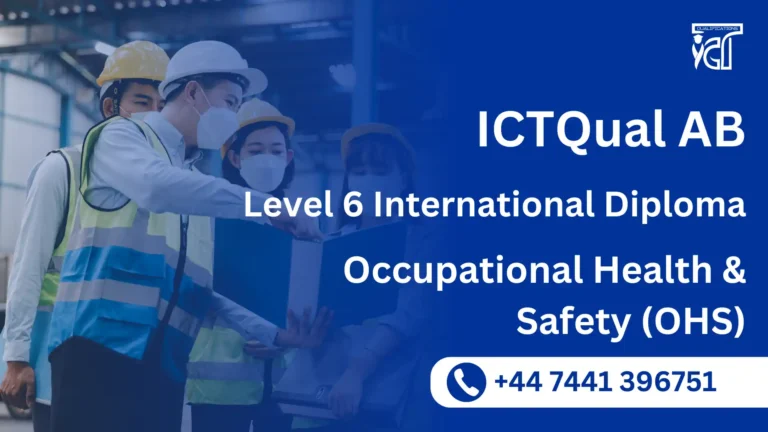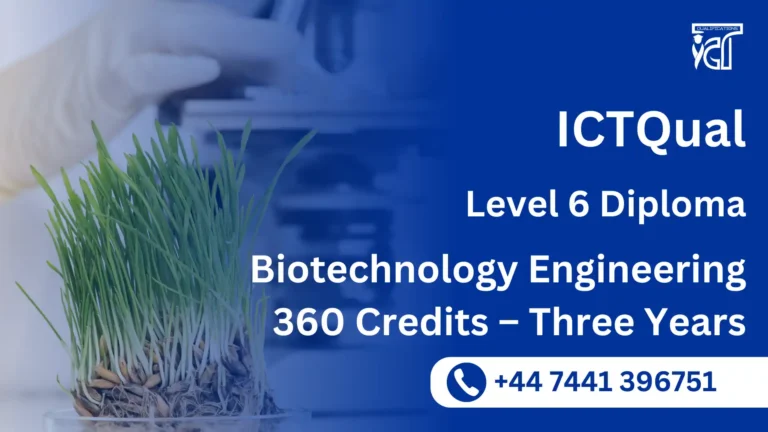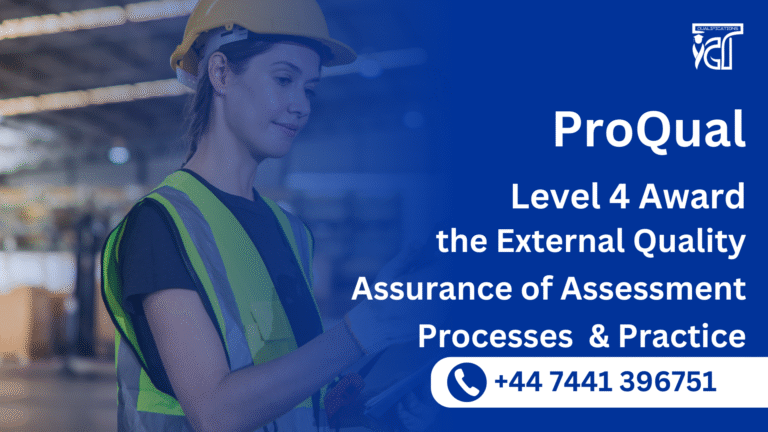The ProQual Level 6 Diploma in Environmental and Sustainability Management is a robust, Ofqual‑regulated qualification equivalent to the final year of a UK bachelor’s degree, designed for professionals aspiring to lead sustainability initiatives within organisations. This diploma blends theoretical frameworks with practical strategies across environmental legislation, resource management, pollution control, and sustainability reporting preparing you to influence positive change and ensure compliance in today’s fast-evolving regulatory landscape.
Spanning seven mandatory units and delivered over approximately 532 guided learning hours (600 total qualification hours), the course covers essential domains such as environmental policy and law, energy efficiency, waste management, and environmental risk and crisis management. Assessment is assignment-based without formal exams, making it highly flexible and ideal for working professionals balancing career and continuing education.
For individuals seeking to elevate their impact, this diploma offers a strategic advantage: enhancing career prospects in roles like Environmental Manager, Sustainability Consultant, CSR Officer, or Environmental Auditor. It’s also a pathway to top-up your qualification to a UK bachelor’s degree, pursue master’s or specialized sustainability credentials, and join professional bodies such as IEMA or relevant environmental associations cementing your status as a sustainability leader on a global scale.
ProQual Level 6 Diploma in Environmental and Sustainability Management
The ProQual Level 6 Diploma in Environmental and Sustainability Management, to achieve the qualification candidates must must complete the all mandatory units of Total Qualification Time (TQT): 600 Hours, Guided Learning Hours (GLH): 532 Hours and 60 credits.:
| Sr# | Unit Title | credit | GLH | TQT |
|---|---|---|---|---|
| 1 | Principles of Environmental Sustainability | 10 | 50 | 100 |
| 2 | Environmental Policy, Law and International Regulations | 10 | 50 | 100 |
| 3 | Environmental Impact Assessment & Corporate Sustainability and Responsibility | 10 | 50 | 100 |
| 4 | Energy Management and Efficiency | 5 | 25 | 50 |
| 5 | Waste Management and Pollution Control | 5 | 25 | 50 |
| 6 | Environmental Risk and Crisis Management | 10 | 50 | 100 |
| 7 | Innovation and Technology for Sustainability Reporting and Performance Measurement | 10 | 50 | 100 |
GLH (Guided Learning Hours) and TQT (Total Qualification Time) are terms commonly used in vocational qualifications to help define the amount of time a learner is expected to spend on their studies.
1. GLH (Guided Learning Hours)
GLH refers to the number of hours a learner spends being directly taught, supervised, or supported during their course. This includes the time spent in activities such as:
- Classroom instruction
- Practical workshops
- One-on-one tutoring or mentoring sessions
- Online learning sessions with tutor support
In other words, GLH represents the time that learners are actively engaged with their instructors or learning activities.
2. TQT (Total Qualification Time)
TQT represents the total amount of time a learner is expected to invest in completing a qualification, including:
- GLH (Guided Learning Hours): Time spent on direct learning, as explained above.
- Self-Directed Learning: This includes time spent on independent study, research, assignment completion, preparation for exams, and any other work the learner does outside of direct teaching hours.
TQT is a broader measure that includes all the time required to achieve the qualification. It helps learners and employers understand the overall commitment required for the qualification.
Key Differences Between GLH and TQT:
- GLH focuses on direct learning with guidance or supervision.
- TQT includes GLH as well as independent study time and other learning-related activities.
Example:
If a qualification has a TQT of 600 hours and a GLH of 250 hours, it means the learner should spend 250 hours in direct learning (classroom, online, or tutor-led sessions) and 350 hours on independent study or research.
1. Principles of Environmental Sustainability
- Understand and apply the core principles of environmental sustainability within an organizational context.
- Recognize the importance of balancing environmental, economic, and social factors to promote sustainable practices.
- Analyze how sustainability principles can be integrated into decision-making and long-term strategies for organizations.
2. Environmental Policy, Law, and International Regulations
- Comprehend the key environmental policies, laws, and regulations at local, national, and international levels.
- Evaluate the impact of regulatory frameworks on business operations and sustainability initiatives.
- Develop strategies to ensure compliance with environmental laws and international sustainability standards.
3. Environmental Impact Assessment & Corporate Sustainability and Responsibility
- Conduct comprehensive Environmental Impact Assessments (EIA) to evaluate the potential environmental effects of projects or business activities.
- Integrate corporate sustainability and social responsibility into business models and strategies.
- Assess the role of organizations in contributing to sustainable development goals (SDGs) and environmental stewardship.
4. Energy Management and Efficiency
- Analyze energy consumption patterns and identify opportunities for improving energy efficiency within organizations.
- Develop and implement energy management strategies to reduce energy usage and costs.
- Evaluate renewable energy alternatives and their role in reducing environmental footprints.
5. Waste Management and Pollution Control
- Understand waste management principles, including waste reduction, recycling, and disposal methods.
- Implement best practices for pollution control to minimize environmental harm.
- Analyze the effectiveness of waste management strategies and pollution reduction programs in various industries.
6. Environmental Risk and Crisis Management
- Identify and assess environmental risks and potential crises that may impact an organization’s operations.
- Develop and implement strategies for crisis management and disaster response in environmental contexts.
- Evaluate the effectiveness of risk management and mitigation measures in preventing or minimizing environmental harm.
7. Innovation and Technology for Sustainability Reporting and Performance Measurement
- Explore technological innovations that support sustainability initiatives, such as data tracking systems and green technologies.
- Develop and implement systems for sustainability reporting and performance measurement in alignment with international standards.
- Analyze how technology can enhance transparency, accountability, and sustainability performance in organizations.
Benefits of the ProQual Level 6 Diploma in Environmental and Sustainability Management
- Ofqual Regulated and Globally Recognized
The ProQual Level 6 Diploma is Ofqual-regulated, ensuring it meets the highest national standards. It is widely recognized by employers and institutions around the world, enhancing your professional credentials and opening up global career opportunities in environmental and sustainability management. - Comprehensive and Specialized Knowledge
This diploma equips you with in-depth knowledge and practical skills in key areas such as environmental management systems, sustainability strategies, energy efficiency, and waste management. This specialized expertise is crucial for tackling contemporary environmental challenges in various industries. - Enhances Career Prospects in a Growing Industry
With the increasing global focus on sustainability and environmental protection, businesses are actively seeking professionals with advanced qualifications in environmental and sustainability management. This diploma can help you stand out and secure roles in environmental consultancy, sustainability leadership, compliance management, and more. - Improved Leadership and Management Skills
The diploma provides valuable insights into strategic management and leadership in sustainability. It prepares you for senior roles where you will lead sustainability initiatives, manage environmental performance, and drive change within organizations to achieve sustainability goals. - Focus on Practical, Real-World Applications
The course emphasizes practical learning through real-world case studies and assignments. You will apply your knowledge to real environmental management issues, enhancing your ability to handle complex sustainability challenges and making the transition from theory to practice seamless. - Enhanced Ability to Drive Organizational Change
As a ProQual Level 6 Diploma holder, you will be equipped to lead organizational change by introducing and managing environmental management systems (EMS), achieving ISO certifications, and promoting a culture of sustainability within your workplace. You will be able to help organizations reduce their environmental footprint, save costs, and meet sustainability targets. - Increased Earning Potential
Professionals with specialized qualifications in sustainability and environmental management are in high demand, and this diploma can significantly increase your earning potential. Completing the Level 6 diploma can qualify you for higher-paying roles with greater responsibility in sustainability leadership and management. - Access to a Wide Range of Careers
This diploma opens the door to numerous career paths, including Environmental Manager, Sustainability Consultant, Sustainability Officer, Compliance Manager, and Corporate Social Responsibility (CSR) Manager. The skills you acquire will allow you to work across various industries such as construction, energy, manufacturing, public sector, and more. - Commitment to Sustainability and Ethical Business Practices
Completing this course allows you to be at the forefront of the growing trend towards corporate social responsibility and sustainable development. The knowledge you gain will enable you to drive ethical business practices that promote environmental protection, social equity, and economic prosperity in line with global sustainability goals. - Tailored Learning for Real-World Success
The course is designed to provide a tailored learning experience that addresses the specific needs of sustainability and environmental professionals. By working through assignments, you will gain a deep understanding of policy, law, environmental auditing, and risk management while developing essential skills in reporting, analysis, and strategy implementation. - Foundation for Further Education
The ProQual Level 6 Diploma serves as an excellent foundation for pursuing further studies. Whether you’re interested in higher-level qualifications like the Level 7 Diploma in Environmental Management or a specialized Master’s degree, this diploma provides the essential knowledge and experience needed to excel in advanced academic or professional study. - Contribution to Global Sustainability Goals
By completing the ProQual Level 6 Diploma, you play an important role in driving sustainability and environmental protection efforts globally. The skills and knowledge you gain will enable you to contribute meaningfully to the achievement of the United Nations Sustainable Development Goals (SDGs) and work towards a greener, more sustainable future.
In conclusion, the ProQual Level 6 Diploma in Environmental and Sustainability Management offers numerous benefits, from enhancing your professional qualifications and career opportunities to equipping you with the skills needed to lead sustainability initiatives within your organization. Whether you’re looking to take on leadership roles or expand your expertise in environmental management, this diploma is an invaluable tool for advancing your career in sustainability.
The ProQual Level 6 Diploma in Environmental and Sustainability Management is ideal for professionals who wish to advance their careers in environmental and sustainability management. This course is designed for individuals who are already working in, or aiming to move into, senior roles in sustainability, environmental management, or related fields. Here’s a look at the best fit for this course:
- Environmental Managers and Sustainability Leaders
If you are currently in a role like Environmental Manager, Sustainability Officer, or Sustainability Manager, this diploma will help you enhance your expertise and move into more senior leadership positions. It provides you with the advanced skills required to manage environmental strategies and lead sustainability initiatives within your organization. - Compliance and Risk Management Professionals
If you work in regulatory compliance, risk management, or environmental auditing, this course will equip you with the knowledge necessary to manage compliance with environmental laws, standards, and regulations. You’ll learn how to ensure your organization remains in line with both national and international sustainability frameworks. - Environmental Consultants
The course is also suitable for environmental consultants who are looking to specialize in sustainability management. You will gain the advanced tools and techniques to help businesses implement and improve their environmental management systems, sustainability reporting, and energy efficiency strategies. - Project Managers in Environmental or Sustainability-Focused Projects
If you manage projects related to sustainability or environmental impact, this diploma will help you develop the skills to incorporate sustainable practices into your project planning, implementation, and monitoring. You’ll learn to align projects with sustainability goals, ensuring they meet environmental regulations and create long-term value. - Corporate Social Responsibility (CSR) Professionals
Individuals working in CSR roles within organizations or NGOs will find this diploma valuable for enhancing their skills in sustainability reporting, performance measurement, and implementing environmental and social responsibility initiatives. - Engineers and Technical Professionals in Environmental Sectors
If you’re an engineer or a technical professional working in fields like construction, energy, or manufacturing, this course will enable you to specialize in environmental and sustainability management, equipping you to design, manage, and implement sustainability-driven projects within your field. - Business Leaders with Sustainability Goals
Senior leaders or business owners aiming to integrate sustainability and environmental management into their overall strategy will benefit from this diploma. It will equip you with the strategic insights to align business operations with sustainability goals and regulations, improving both environmental and business performance. - Individuals Seeking Career Advancement in Sustainability and Environmental Management
If you’re looking to transition into a sustainability career or advance into senior leadership roles, this qualification is an excellent fit. It provides the necessary knowledge to help you make informed decisions, improve organizational sustainability, and drive positive change at higher management levels. - Government and Policy Advisors
Professionals working in government departments, local authorities, or policy advisory roles will benefit from the comprehensive understanding of sustainability policy and regulatory frameworks provided by this course. It helps you develop the expertise needed to create, implement, and assess policies that support environmental sustainability goals. - Aspiring Sustainability Entrepreneurs
If you are an entrepreneur or small business owner interested in creating a business with a strong sustainability focus, this diploma offers the knowledge to develop a sustainable business model, reduce environmental impact, and incorporate sustainable practices into your operations.
Future Progression After Completing the ProQual Level 6 Diploma in Environmental and Sustainability Management
- Advance into High-Level Sustainability Roles
- Progress into impactful positions such as:
- Environmental and Sustainability Manager
- Corporate Social Responsibility (CSR) Lead
- Environmental Auditor
- ESG (Environmental, Social, Governance) Analyst
- Sustainability Consultant
- Progress into impactful positions such as:
- Pursue Chartered and Professional Memberships
- Fulfils academic requirements for progression to:
- IEMA Membership (Institute of Environmental Management and Assessment)
- CEnv (Chartered Environmentalist) status through recognised routes
- Fulfils academic requirements for progression to:
- Open Pathways to Further Academic Qualifications
- Offers eligibility for progression to:
- UK bachelor’s degree top-up programs
- Postgraduate or Master’s degrees in Sustainability, Environmental Management, or Climate Policy
- Professional certifications in ESG, Green Finance, and Circular Economy
- Offers eligibility for progression to:
- Global Career Opportunities in Multiple Sectors
- Recognized by employers in:
- Construction, Energy, Utilities, Manufacturing, Local Government, NGOs, and Corporate Enterprises
- Boosts global employability and sustainability leadership potential
- Recognized by employers in:
- Develop Skills for Green and Net Zero Economies
- Prepares you for emerging roles in carbon management, net-zero strategy, and renewable energy compliance
- Lead Environmental Compliance and Innovation
- Equip yourself to drive change, implement sustainable systems, and ensure legal compliance across complex organizations
- Support CPD and Long-Term Professional Growth
- Contributes to your Continuing Professional Development (CPD) plan
- Keeps your knowledge aligned with latest sustainability frameworks, ISO standards, and environmental legislation
Entry Requirements
Register Now
Qualification Process
Qualification Process for the ProQual Level 6 Diploma in Environmental and Sustainability Management
- Self-Assessment:
Begin by evaluating your eligibility to ensure you meet the qualification requirements, including work experience, knowledge, and language proficiency. - Registration:
Complete your registration by submitting the required documents, including a scanned copy of a valid ID, and paying the registration fee. - Induction:
An assessor will conduct an induction to confirm your eligibility for the course and explain the evidence requirements. If you do not meet the criteria, your registration will be canceled, and the fee will be refunded. - Assignmnets & Evidence Submission:
Provide all assignmnets and the necessary evidence based on the assessment criteria outlined in the course. If you are unsure of the required evidence, consult with the assessor for guidance on the type and nature of evidence needed. - Feedback and Revision:
The assessor will review your submitted evidence and provide feedback. Evidence that meets the criteria will be marked as “Criteria Met,” while any gaps will be identified. You will be asked to revise and resubmit if needed. - Competence Evidence:
Submit final evidence demonstrating that all learning outcomes have been met. This evidence will be marked as “Criteria Met” by the assessor once it is satisfactory. - Internal Quality Assurance (IQA):
The Internal Quality Assurance Verifier (IQA) will review your evidence to ensure consistency, quality, and compliance with standards. - External Verification:
The IQA will submit your portfolio to ProQual’s External Quality Assurance Verifiers (EQA) for final confirmation. The EQA may contact you directly to verify the authenticity of your evidence. - Certification:
Upon successful completion of all checks, ProQual will issue your official certificate, confirming that you have attained the ProQual Level 6 Diploma in Environmental and Sustainability Management
FAQs for ProQual Level 6 Diploma in Environmental and Sustainability Management







